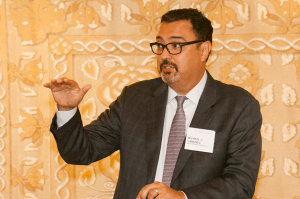
The North American Free Trade Agreement (NAFTA) is at the center of the nation’s future economic competitiveness and national security, an international strategist told a California Chamber of Commerce audience last week.
NAFTA has turned the United States, Mexico and Canada into a manufacturing powerhouse, Michael C. Camuñez, president and CEO of Monarch Global Strategies, said at the CalChamber international breakfast on September 8. See text of remarks as prepared for delivery.
Co-Production
U.S. industries that created cross-border production chains have been particularly successful, Camuñez pointed out.
One example, he said, is automobile manufacturing, where products advertised as Made in U.S.A. include significant components from both Mexico and Canada. Inputs cross international borders six or seven times before completion of the final product, he commented.
Mexico sends 80% of its exports to the United States, he said, but 40% to 45% of some of those exports are U.S.-made components, pulling on supply chains that include small and medium-sized manufacturing employers and creating jobs.
National Security
Camuñez encouraged listeners to look beyond press-fueled stereotypes of Mexico as a crime capital. He noted that the United States shares a 3,000-mile border with Mexico and contrasted that border with others in the world that are shorter and less secure.
Security in air travel depends on Mexico, he said, pointing out that Mexico clears and vets out air passengers from around the world who are on the U.S. watch list.
NAFTA Negotiations
U.S. global leadership developed over multiple generations of support for free markets, liberalized trade and recognition that protectionist policies contributed to the Great Depression, said Camuñez.
In the current round of discussions about NAFTA, however, the United States is advancing protectionist positions that run contrary to the history of support for free trade principles, he said.
The approach, he said, is hurting U.S. credibility with Canada, Mexico and the world.
There are areas of agreement of what needs to be done to modernize NAFTA, he said, citing as examples:
- digital commerce, including software as a service, recognition of electronic signatures and the free flow of data:
- labor contracts, such as abiding by international labor standards (for example no use of child labor);
- environment: the idea that a country can’t degrade the environment to gain a competitive advantage;
- state-owned enterprises: making sure that the government-owned operation has to compete on a level playing field with private entities and abide by market principles.
So far, Camuñez observed, the United States has done much posturing and “socializing lots of concepts,” but not supplying actual text for chapters of the agreement.
The “biggest wild card” in the negotiation process, he said, is President Donald Trump.
CalChamber NAFTA Position
 The California Chamber of Commerce understands that the NAFTA was negotiated more than 25 years ago, and, while our economy and businesses have changed considerably over that period, NAFTA has not. We agree with the premise that the United States should seek to support higher-paying jobs in the United States and to grow the U.S. economy by improving U.S. opportunities under NAFTA.
The California Chamber of Commerce understands that the NAFTA was negotiated more than 25 years ago, and, while our economy and businesses have changed considerably over that period, NAFTA has not. We agree with the premise that the United States should seek to support higher-paying jobs in the United States and to grow the U.S. economy by improving U.S. opportunities under NAFTA.
The provisions of the North American Free Trade Agreement with Canada and Mexico have been beneficial for American industries, agricultural enterprises, farmers, ranchers, energy companies and automakers. Any renegotiation of NAFTA must recognize the gains achieved and ensure that U.S. trade with Canada and Mexico remains strong and without interruption.
The CalChamber actively supported the creation of the NAFTA among the United States, Canada and Mexico, comprising 484.3 million people with combined annual trade with the United States being around $1.069 trillion in 2016. In 2016, goods exports totaled over $496.919 billion while goods imports totaled nearly $572.217 billion.
The CalChamber’s long-standing support for NAFTA is based upon an assessment that it serves the employment, trading and environmental interests of California and the United States, as well as Canada and Mexico, and is beneficial to the business community and society as a whole. Since 1993, trade among the three NAFTA countries has nearly quadrupled.
The California Chamber of Commerce now urges a quick and efficient process, and one that does not hinder ongoing trade and investment among the three NAFTA members who must be kept united in the same end-goal of a successful renegotiation. Throughout this process, the Trade Promotion Authority with its objectives and procedures should be followed. Further, during the process, the CalChamber encourages re-examination of the provisions agreed upon by the three countries during the already negotiated Trans-Pacific Partnership, as these may provide a starting point for further discussion.
Staff Contact: Susanne T. Stirling



